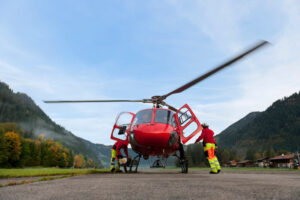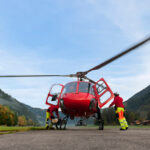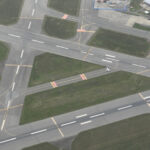Treat Your Day-to-Day Health as Important as Your Pilot Medical
Aviation headlines are increasingly alarming, with a concerning number of near misses making the news. The recent close call at Logan Airport is particularly troubling. Despite having a current pilot medical, the Learjet 60 pilot attributed the incident to feeling unwell with a stuffy nose. This raises serious concerns.
The incident occurred during intersecting runway operations at Logan, with the Learjet cleared to line up and wait on runway 9 while a JetBlue plane was given clearance to land on runway 4R. However, after reading back the line up and wait instructions, the Learjet crew began the takeoff roll instead.
Thankfully, the controllers in the tower had access to modern technology that alerted them to the potential conflict. They immediately instructed JetBlue to go-around, resulting in the two aircraft narrowly avoiding a collision by a mere 400 feet as the E190 passed above the Lear.
Now, the question arises: Why did the Learjet crew take off without clearance? Both crew members read back the line up and wait instructions, yet neither processed the information. Isn’t this what crew resource management is for? It’s concerning that both individuals failed to ensure they were following the correct procedure.
Reasons to Watch Your Overall Health
- Complying with Aviation Regulations: Aviation regulatory bodies mandate that pilots meet specific medical standards to hold and maintain their licenses. Pilots must adhere to these regulations, undergo regular medical assessments, and provide accurate information about their health to ensure compliance and continued flight eligibility.
- Promoting a Culture of Safety: By prioritizing your health, you set an example and contribute to a safety culture within the aviation industry. This emphasis on personal well-being reinforces the importance of maintaining physical and mental fitness among all aviation professionals.
- Safety of the Pilot and Passengers: The primary reason for pilots being medically fit to fly is to ensure their and their passengers’ safety. Pilots must be in optimal physical and mental condition to make split-second decisions, react appropriately to emergencies, and handle the complexities of aviation safely.
- Maintaining Peak Performance: Physical fitness directly affects a pilot’s performance. Regular exercise and a healthy lifestyle improve alertness, cognitive function, and overall well-being. Pilots prioritizing their health are better equipped to maintain focus, sustain attention during long flights, and handle the demands of flying at high altitudes.
- Understanding the Effects of Altitude and Air Pressure: Flying at high altitudes exposes pilots to unique physiological challenges. Changes in air pressure and reduced oxygen levels can affect respiratory function and cardiovascular performance. Pilots must undergo medical assessments to tolerate these changes without compromising their performance or safety.
- Managing Stress Levels: Aviation is a high-stress industry, and pilots often face demanding situations in the air and on the ground. High-stress levels can impact decision-making, situational awareness, and overall performance. Pilots should prioritize stress management techniques, regularly self-care, and seek support when needed to maintain optimal mental health.
- Addressing Medications and Their Effects: Certain medications can have side effects that impair a pilot’s ability to operate an aircraft safely. Pilots must consult with medical professionals who understand the unique requirements of aviation medicine. Ensuring appropriate medication management is essential to prevent any adverse effects during flight.
- Staying Up-to-Date on Immunizations: Pilots should maintain up-to-date immunizations to protect themselves and their passengers from infectious diseases. They should follow guidelines set by aviation regulatory bodies and consult with healthcare providers familiar with aviation medicine to ensure compliance.
- Understanding the Impact of G-forces: Pilots must comprehend the effects of G-forces on their bodies during maneuvers such as takeoffs, landings, and aerobatic maneuvers. These forces can cause physiological stress, affecting blood circulation and sensory perception. Being medically fit helps pilots withstand these stresses and minimize the risk of experiencing adverse effects.
- Monitoring Medical Conditions: Regular check-ups and medical screenings are crucial to identify and manage any underlying medical conditions that could pose risks during flight. Conditions such as cardiovascular diseases, diabetes, vision impairments, and neurological disorders can impact a pilot’s ability to perform effectively. Timely detection and management of these conditions can help prevent potential complications.
In the case of the Learjet captain, he claimed he heard the clearance to line up and wait, but his mind processed it as cleared for takeoff. He doesn’t understand why he made that mistake, but he did mention that the cold temperature in Boston that night affected him, and he wasn’t feeling well. But what about the co-pilot? It was the co-pilot who read back the taxi and wait clearance.
According to the co-pilot, he asked the captain if they were cleared for takeoff and received a positive response, leading them to proceed. If either of them had expressed doubt or double-checked via radio, this incident could have been avoided. It’s worrisome that both crew members misunderstood the situation.
Perhaps the captain should have reconsidered flying that day, prioritizing how he felt at that moment over his overall health during the pilot medical. Thankfully, the safety systems in place did their job, preventing a major accident. Pilots prioritize their health by contributing to a safer and more secure aviation environment for themselves, their passengers, and their fellow aviation professionals.










